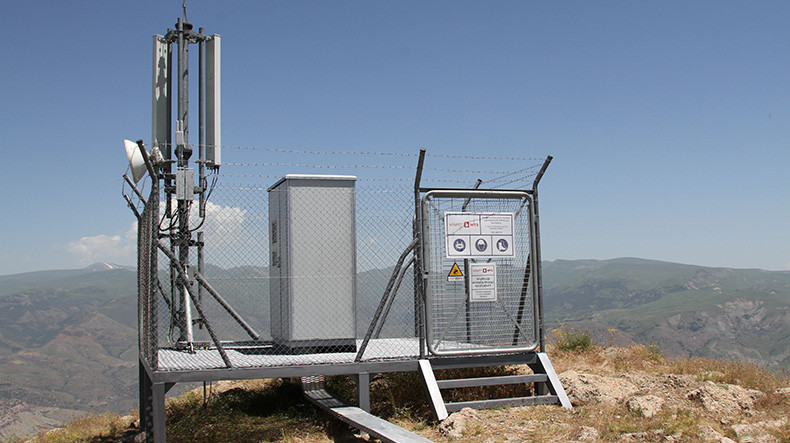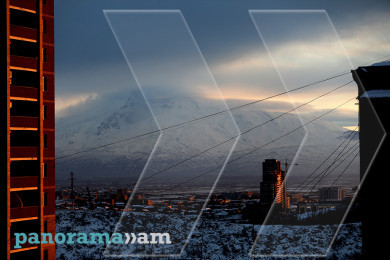
VivaCell-MTS’ new base-transceiver station provides Internet services in over 80% of the Khosrov Forest State Reserve
VivaCell-MTS has installed a new base-transceiver station on Mount Dahnak, providing cellular and Internet connection in over 80% of the area of the Caucasus Wildlife Refuge and the Khosrov Forest State Reserve. The project was implemented in collaboration with The Foundation for the Preservation of Wildlife and Cultural Assets.
As the company reports in a press statement, the newly installed station will allow for a shorter response time in case of emergencies, especially during fires, and will enable the installation of IP and GPS state-of-the-art cameras for the online monitoring of the area. The monitoring will help detect the movement of wild species and will serve for collecting information, raising the effectiveness of the scientific research works conducted in the Refuge. In addition to transferring information in real time, the base-transceiver station will also provide the rangers of the Caucasus Wildlife Refuge with reliable cellular communication, so necessary in this high-altitude area.
The base station, located at over 2500 m above the sea level, is 100% powered by solar energy. Because of the nature of the terrain relief and the remote location of the electric power supply line, laying power lines from the regular electricity source would have been difficult and ineffective. In general, the high-mountainous landscape adds to the difficulty of the construction works. Climbing up the mountain area is difficult even for special transportation vehicles.
The location of Mount Dahnak is particularly suitable for installation of solar panels. On average, the solar panels, providing power supply to the base station, generate 3 kWh electricity. Along with the solar panels, accumulator batteries have been installed to ensure the uninterrupted power supply of the base station during night hours. However, as a backup option, a diesel generator will be deployed automatically in case of prolonged poor weather conditions or heavy precipitation, to ensure uninterrupted provision of mobile and Internet connection.
The news of the installation of a base-transceiver station on Mount Dahnak was first announced on VivaCell-MTS official Facebook page (https://www.facebook.com/MTSArmenia/). General Manager Ralph Yirikian showed the page followers via Facebook Live the BTS, installed in this high-altitude area, and its surrounding landscape. “The installation of the solar-powered base-transceiver station on Mount Dahnak has a number of objectives. It enables us to provide voice and data services within a wide radius that is very important for ensuring reliable connection between the rangers and transferring real-time information via surveillance devices. The use of renewable energy sources, as an alternative power supply solution for base stations and in projects implemented by collaborating organizations, is one of the most important long-term objectives of VivaCell-MTS. Installation of base stations in mountainous, unpopulated areas is not guided by return-on-investment consideration even in the long term, and is aimed solely at supporting important environmental initiatives and eco-tourism,” said VivaCell-MTS General Manager Ralph Yirikian.
“An operation of the station solves several problems, the most important being the opportunity to monitor wild species more productively in Mount Dahnak and neighboring sectors in the Caucasus Wildlife Refuge area. The newly installed station will allow for a quicker response in case of emergencies, especially during fires in over 80% of the area around the Khosrov Forest State Reserve. Cellular and Internet connection availability will become an essential help to operate the newest satellite and GPS devices for wild species data collection. The station's environmental component are the solar panels, which have an important impetus on environmental culture and mentality, a dimension that FPWC has been working since establishment. Solar panels provided by the FPWC are a successful precedent of the partnership of non-profit and private sectors in finding a consolidated solution to environmental issues”,- said FPWC Founder Ruben Khachatryan.
The Caucasus Wildlife Refuge is located near Urtsadzor village of Ararat region and covers a 2000 ha area stretching along the border of the Khosrov Forest State Reserve. It has become a migration corridor for endangered species, serving as a buffer zone for the Khosrov Forest State Reserve, where a significant growth of the territory’s biodiversity, particularly an increase in the number of the Bezoar goats, is reported.
This is not the first base station to have been installed on Mount Dahnak. Already in the year 2014, VivaCell-MTS installed a base-transceiver station in a high-altitude area adjacent to the Khosrov Forest State Reserve, that provides broadband Internet and cellular connection on the territory of the Caucasus Wildlife Refuge and its surrounding areas. The digital cameras, equipped with SIM-card modules, provided by VivaCell-MTS, allow real-time transfer of the information from the Caucasus Wildlife Refuge to the Urtsadzor Eco-Training Center.
Newsfeed
Videos






























